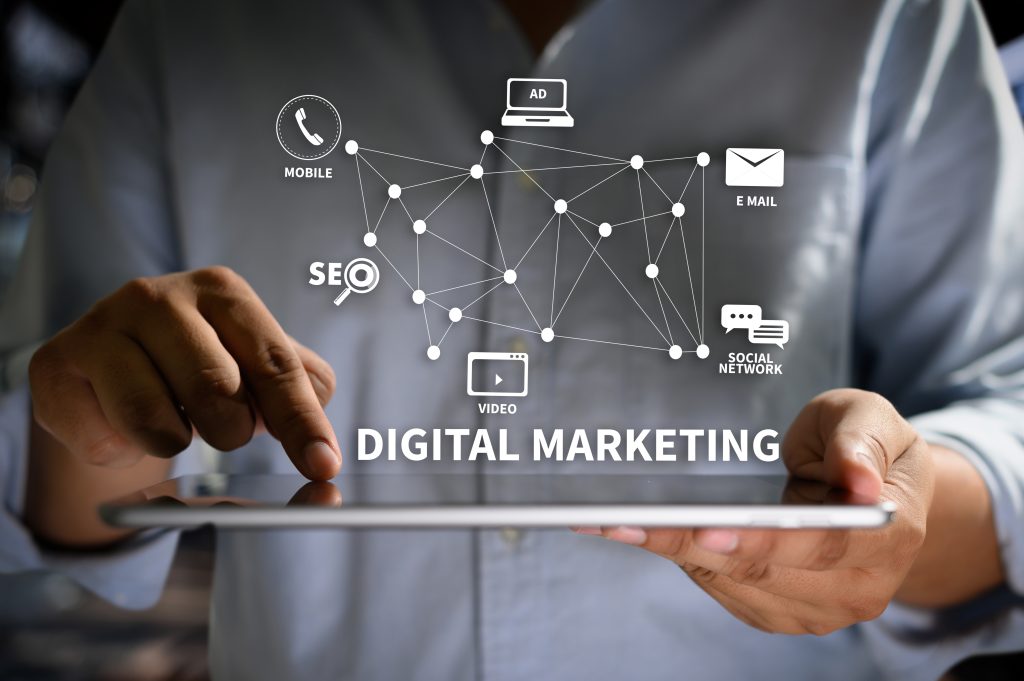Digital marketing is not an exception to the way artificial intelligence (AI) is revolutionising a number of industries. AI’s ability to analyze data, automate processes, and improve customer interactions is reshaping how digital marketing agencies operate. The impact of AI is profound, influencing everything from content creation to customer relationship management. In this blog, we will explore how Effect of AI on digital marketing agencies and what the future holds for this evolving industry.

1. The Rise of AI in Digital Marketing
AI’s presence in digital marketing has grown significantly in recent years. Machine learning algorithms, natural language processing (NLP), and predictive analytics have enabled marketers to better understand consumer behavior, optimize ad campaigns, and enhance customer experiences. With AI-driven tools, agencies can now automate repetitive tasks, personalize content, and make data-driven decisions faster than ever before.
2. Enhanced Data Analytics and Decision Making
One of the most significant advantages of AI is its ability to process vast amounts of data and extract meaningful insights. Traditional data analysis methods often require extensive human effort and time, but AI-driven tools can analyze consumer behavior, trends, and patterns within seconds.
- Predictive Analytics: AI-powered predictive analytics help marketers anticipate customer needs and preferences, allowing agencies to craft more effective marketing strategies.
- Real-time Data Processing: AI enables real-time tracking and analysis, helping marketers make instant adjustments to campaigns for better results.
- Behavioral Insights: AI can analyze user behavior across different digital platforms to provide valuable insights into what resonates with target audiences.
3. Personalization and Customer Engagement
Consumers expect personalized experiences, and AI has made it easier for digital marketing agencies to deliver on this demand. AI-driven tools help marketers tailor content, product recommendations, and marketing messages to individual users.
- Chatbots and Virtual Assistants: AI-powered chatbots provide instant responses to customer inquiries, enhancing user experience and engagement.
- Dynamic Content Personalization: AI can customize website content, emails, and advertisements based on a user’s browsing history and preferences.
- Automated Email Marketing: AI improves email campaigns by segmenting audiences and sending personalized messages at optimal times.
4. AI-Powered Content Creation and Optimization
Creating high-quality content is a crucial aspect of digital marketing, and AI is now playing a significant role in content generation and optimization.
- AI-Generated Content: Tools like GPT-based models can generate blog posts, social media captions, and product descriptions efficiently.
- SEO Optimization: AI tools analyze search engine algorithms and suggest keyword strategies to improve organic rankings.
- Visual Content Enhancement: AI-powered design tools help create stunning visuals, infographics, and video content for marketing campaigns.
5. Improved Advertising and Campaign Performance
AI has significantly impacted digital advertising by optimizing ad campaigns for better performance and ROI.
- Programmatic Advertising: AI automates the buying and placement of ads in real-time, ensuring they reach the right audience at the right time.
- AI-Driven Ad Targeting: AI analyzes user data to create highly targeted ads, improving conversion rates and reducing ad spend wastage.
- A/B Testing and Optimization: AI continuously tests and refines ad creatives, headlines, and landing pages to maximize effectiveness.
6. Social Media Management and AI
Social media is an integral part of digital marketing, and AI has made managing social media campaigns more efficient.
- Social Listening Tools: AI monitors social media conversations, sentiment, and trends to help marketers understand audience preferences.
- Automated Scheduling and Posting: AI-powered tools streamline social media scheduling, ensuring consistent content delivery.
- Influencer Marketing Optimization: AI identifies the best influencers based on engagement metrics and audience demographics.
7. AI in Customer Relationship Management (CRM)
AI-driven CRM systems have improved how digital marketing agencies manage customer relationships and interactions.
- Lead Scoring and Qualification: AI ranks leads based on their likelihood to convert, helping sales teams focus on high-value prospects.
- Automated Customer Support: AI chatbots and virtual assistants handle customer queries, freeing up human agents for complex issues.
- Sentiment Analysis: AI evaluates customer feedback to measure brand sentiment and improve customer satisfaction.
8. Challenges and Ethical Considerations
While AI offers numerous benefits, digital marketing agencies must navigate challenges and ethical considerations.
- Data Privacy Concerns: AI relies on large datasets, raising concerns about consumer data privacy and security.
- Job Displacement: Automation may replace certain marketing roles, necessitating workforce upskilling.
- Bias in AI Algorithms: AI models can inherit biases from training data, potentially leading to unfair targeting or discriminatory advertising.
9. The Future of AI in Digital Marketing Agencies
AI’s role in digital marketing will continue to expand, with several trends shaping the future:
- Voice Search Optimization: As voice assistants grow in popularity, optimizing content for voice search will become crucial.
- Hyper-Personalization: AI will further refine personalization, delivering highly customized marketing experiences.
- Augmented Reality (AR) and AI Integration: AI-powered AR experiences will enhance digital marketing campaigns, creating immersive brand interactions.
- AI-Powered Video Marketing: AI will revolutionize video creation, editing, and personalization to engage audiences more effectively.
Conclusion
AI is revolutionizing the digital marketing landscape, enabling agencies to work smarter, not harder. From data analytics to personalized customer engagement and automation, AI-driven tools are optimizing every aspect of marketing. While challenges exist, the benefits far outweigh the drawbacks, making AI an indispensable asset for digital marketing agencies. As AI continues to evolve, agencies that embrace and adapt to these advancements will thrive in an increasingly competitive digital space.